Straight talk on "self-help" in neighborhood revitalization
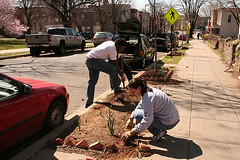 Treebox repair on Montello and Trinidad Avenues, northeast quadrant, Washington, DC. Flickr photos by Inked78.
Treebox repair on Montello and Trinidad Avenues, northeast quadrant, Washington, DC. Flickr photos by Inked78.One of the things that frustrates me about community involvement is the belief on the part of many citizens that if you find the right government official to call, somehow, they'll fix everything. The reality is that you have to participate and work for change yourself, with others. That's what community organizing is all about. (cf. Learned Helplessness; definition of infantilization; COMM-ORG: The On-Line Conference On Community Organizing and Development)
Donald Shoup, the UCLA professor who authored the book The High Cost of Free Parking, was talking about his work a couple months ago at a DC conference and he said something that confirmed my own thinking about this.
He said that government resources should be directed to neighborhoods that have demonstrated commitment by already "helping themselves."
Should resources go to communities that aren't working to better themselves? Or to the communities that have demonstrated, by getting out there and doing things already, to ensure that "outside" investments will take and have impact, and won't be wasted?
While I won't catalog here a variety of examples from DC, there is no question that without upfront investment in capacity building and real, not fake, citizen engagement processes, much of these kinds of public and other nonprofit investments in communities are wasted.
In my opinion, the city invests very little in capacity building and community organizing, and it shows. But at the same time, it doesn't seem to make sense to put resources in communities that have a lot of resources and aren't using them, or when comparing two neighborhoods of equal means, choices can be made by putting money into communities where the people are engaged... (E.g., Connecticut Avenue north of Dupont Circle is dirty, and that community has plenty of resources, including now, a sputtering Main Street program...)
My controversial two cents anyway.
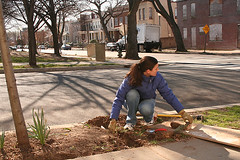
In this light, this recent post from the Trinidad-Ivy City Community Garden Glub (cross-posted to Frozen Tropics) is instructive:
Now that spring is in the air & the bulbs are coming up, it is time once again for the Tinidad-Ivy City Community Garden Club to take up our shovels and make an appearance on the corner.
We did a little treebox repair project last weekend before kicking off the public season for the year. Our bricklined treeboxes on Montello endured a bit of fall/winter abuse.
We decided to undertake this particular task before opening the public season because we want to move forward and welcome new members with the strong message that we don't just want to do one time planting projects. We want to keep returning to the scene of the crime to maintain what we have created.
We believe that building a strong community is about following through & being there for the long run.
Occasional clean-ups are a great thing, don't get us wrong, but isolated events are...um, isolated. They each become just a flash in the pan.
So, while planting treeboxes is fun & the flowers look much better than the debris that once occupied the space, the planting of treeboxes is not our end goal.
We hope that by getting neighbors our out on the street & talking & working together, that maybe a little community building can happen along the way.
And just maybe, if enough of us are out there on a regular basis, we can get to know our neighbors a little better & strive to work together to make Trinidad the best community it can be.
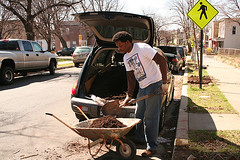
Note that this is tricky. The issue isn't necessarily the lack of "leadership" but the failure to engage citizens in truly participatory ways.
Too often neighborhoods have plenty of leadership, but it is focused on exclusivity and isn't very innovative. I call this backwards-looking leadership. What happens is that this kind of leadership is excellent at maintaining the status quo, whether it is intentional or not, making it much much much much much more difficult to move neighborhoods forward.
Backwards-looking leadership tends to be reactive, doesn't think about bringing the neighborhood together to craft a vision for the future of the neighborhood, looks to the government for direction, guidance, and action in most arenas, and without a commonly-held community vision, can't address proposals for change--coming from either inside or outside of the neighborhood--in a systematic and measured manner. (cf. How to Turn a Place Around; Leading by Stepping Back: A Guide for City Officials on Building Neighborhood Capacity; City-Sponsored Community Building: Savannah's Grants for Blocks Story; Smart Communities Blog; Neighbourhoods & Social Capital )
In my own neighborhood, I call these kinds of leaders "the squalor contingent" (for examples I would point to the leaders of the Linden Neighborhood Association and community organizations and leaders often associated with the local community development corporation).
I recognize this is in part both a legitimate fear of change and built on a past history of being manipulated on what are seemingly race issues but really are about class and power (see: [a.] "the race card" and [b.] "the plan" for whites to retake control of "Chocolate City" and remake it into a "white" "Chocolate City." (cf. BBC News E-CYCLOPEDIA Playing the race card: Trump or joker?; Explorations in Social Inequality; From Urbanization to Cities: Toward a New Politics of Citizenship)
But we can't afford to keep sweeping this under the rug. We need to grapple with it, because our neighborhoods are held hostage as long as we cover our eyes and avoid these "difficulties."
To be clear, I am talking about more ground-up leadership development efforts, rather than providing more money to business as usual and the traditional patterns of co-optation of community organizations.
Note/1: my "technique" of being direct, interpreting these structures and systems of community involvement and behavior, and naming them isn't always the most effective way to go about things either...
Note/2: action is a lot better than sticking your head in the sand ostrich-like and opposing everything, because change will happen whether you want it or not (it's about capital and the "exchange value of place") and flailing about and fighting change ends up eliminating your ability to influence and improve the final result.
Note/3: it's hard to perfect being an "inside outsider" by participating in the planning processes and helping to improve them, without making it hard to be a more "inside" person because at the end, criticism of any kind isn't really valued. I don't think of it as criticism but as directed comments oriented towards ultimate project improvement. People in power have a difficult time with this distinction.
Note/4: rolling over because something is better than a vacant lot, but ultimately not all that great isn't really a step forward either. As I say, "better than cinder block isn't the level of quality that should satisfy us."
Note/5: demand excellence in all that comprises our built and natural environment. Always.
As I say "when you ask for nothing, that's what you get. When you ask for the world, you don't get it, but you get a lot more than nothing."
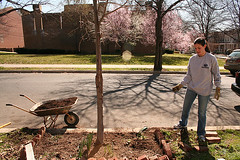
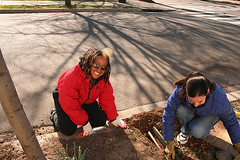 Click here for more photos of the Trinidad-Ivy City Community Garden Club in action.
Click here for more photos of the Trinidad-Ivy City Community Garden Club in action.Index Keywords: civic-engagement



1 Comments:
Thank you for providing such a valuable information and thanks for sharing this matter.
Post a Comment
<< Home